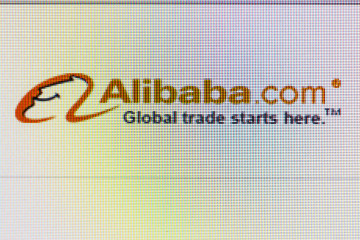Bloomberg Business: As Nasdaq Soars, China’s Alibaba-Led Dot-Com Boom Starts to Fade
©2015 Bloomberg News
NLN6JS6JTSED
(Bloomberg) — Just as the Nasdaq Composite Index surges to the cusp of the record high set during the dot-com-era, the excitement about China’s Internet boom is fading.
Half of the 14 Chinese dot-coms that debuted in the U.S. last year are now trading below their initial sale prices. Even Alibaba Group Holding Ltd., one of those still up in price, has dropped 28 percent from its record high in November. On average, the 14 Chinese shares are down 3.1 percent this year, compared with a 6.1 percent advance in the Nasdaq. Investor confidence, so high when Alibaba brought its record $25 billion initial public offering to market last September, is being undermined now by a wave of poor earnings at Chinese technology companies. Those that went public last year including Weibo Corp., the microblogging service, and mobile dating app developer Momo Inc. have failed to deliver the revenue investors were expecting. “The market is nervous,” Michael Wang, a strategist at Amiya Capital LLP in London, said by e-mail March 18. “Whether investors come back is questionable.” The earnings disappointment — and stocks’ slump — is clearly a reflection in part of the slowdown in the world’s second-biggest economy, but a look at broader Chinese equity gauges shows that can’t be the only explanation. The benchmark index in Shanghai is up 13 percent this year through Friday, part of a 78 percent rally since mid-2014, and Bloomberg’s gauge of Chinese shares traded in New York has climbed 5.1 percent.
Quarterly Losses
The Shanghai Composite rose 0.7 percent to 3,641.83 at 9:48 a.m. local time, heading for a ninth day of gains, the longest winning streak since 2007. Buoyed by the growth prospect of the world’s largest Internet market with 649 million users, investors assigned higher valuations for the Chinese companies than their U.S. peers at the IPOs. Intensifying competition and spending increases, however, are taking a toll on revenue growth, prompting investors to now scale back those valuations. Sixteen of 28 Internet and technology firms in Bloomberg’s China benchmark reported fourth-quarter earnings below analysts’ forecasts, including search engine Baidu Inc. and video website Youku Tudou Inc. The percentage of stocks that slid below their IPO levels this year was the highest since 2011, when a series of corporate scandals eroded investor confidence, data compiled by Bloomberg show.
Weibo, WeChat
Momo, whose matchmaking app is akin to Tinder Inc.’s, said it lost $2.5 million in the fourth quarter as it boosted marketing expenses six-fold to promote its brand. The stock has fallen 8 percent this month, extending the decline to 23 percent since December when it raised $248 million. While the valuation has declined to about 20 times sales from almost 300 times at the IPO, it’s still more expensive than Facebook Inc., which has a multiple of 18. The company’s press office, in an e-mailed response to questions on March 18, said Momo is focused on a long-term strategy and it’s too early to judge it’s success. Weibo, which operates a website similar to Twitter Inc.’s, has tumbled more than 21 percent, wiping out $1.4 billion in market value, since its November debut, amid competition from WeChat, the social networking service owned by Tencent Inc. Sales will drop to as low as $93 million this quarter, from $105 million the previous three-month period, the company said on March 10. Investors are concerned that Tencent’s decision to begin selling advertising on WeChat’s mobile messaging platform may lure some advertisers away from Weibo, Yue Yao, an analyst at Morningstar Inc., said by e-mail on March 15. Beijing-based Weibo has 175.7 million monthly users, less than half the users of Tencent’s WeChat.
IPO Pipeline
When asked about the company’s performance, spokesman Julien Gong Min referred to comments Chief Executive Officer Wang Geofei made during a March 10 conference call during which he said competition from WeChat will benefit all companies because it “increases the overall scale of the industry.” While some of last year’s IPOs didn’t perform as expected, it won’t deter investors’ interests in Chinese companies, according to analysts at 86Research Ltd., Rosenblatt Securities Inc., and JG Capital Corp. Six Chinese companies, including search engine Sogou Inc., may go public in New York this year, they estimate. Sogou, which is controlled by Sohu.com Inc., is planning a U.S. IPO as early as the second half of this year, at a valuation of more than $3 billion, people with knowledge of the matter said last week. The people asked not to be identified because the information is private.
‘Pickier’ Investors
“Investors will be a little bit pickier this year, but there is still a lot of interest in the sector,” Cheng Cheng, an analyst at Pacific Crest Securities LLC, said by phone March 18. Mainland investors may be shifting their funds from U.S. listed companies to the domestic market after the benchmark Shanghai Composite Index entered a bull market, according to Jun Zhang, head of China research at Rosenblatt Securities Inc. The domestic benchmark touched a five-year high March 18, on speculation the government may take steps to boost the economy. The most-actively traded Chinese companies in the U.S. only increased 1.4 percent during the same period.
While Youku, a small-cap Internet television company, has fallen 39 percent since a high in November in the U.S., rival Leshi Internet & Technology Corp., which is traded on the Shanghai Composite Index, rallied 144 percent during the same period. “As ADRs lose domestic support, many foreign investors will exit as well,” Zhang said by phone from San Francisco on March 18. “Long-term American investors tend to avoid small-cap Chinese companies if the domestic investment isn’t there.”
To contact the reporters on this story: Stephen Stapczynski in New York at sstapczynsk1@bloomberg.net; Ye Xie in New York at yxie6@bloomberg.net To contact the editors responsible for this story: Nikolaj Gammeltoft at ngammeltoft@bloomberg.net Richard Richtmyer







No Comment